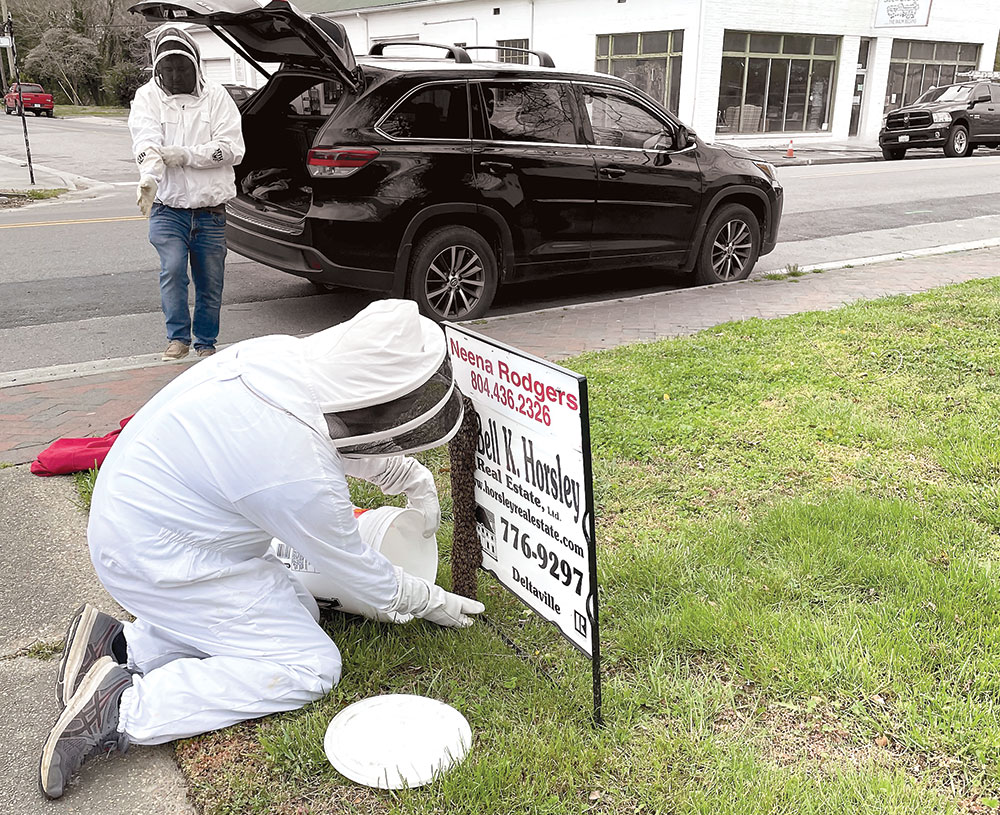
Urbanna abuzz as hundreds of bees mass just off Virginia Street
With the days warming, bees swarmed in Urbanna on Saturday, April 6. They congregated on an Isabell Horsley Real Estate sign at the Marble House and were later collected by a beekeeper who will make a new hive with them.
Bees swarm because a decision has been made in the hive that nature is providing enough bounty like pollen and nectar allowing the hive to double in size, said master beekeeper Rick Krogh of Locust Hill.
Expansion is a sign of good hive health. It means the colony has grown and survived the winter. Typically 45% of bees die over the winter, said Krogh.
Democracy
Krogh explained that when the old hive is no longer big enough, the colony decides to divide and a location is needed for the new hive.
Beehives are a “democracy” and bees “vote” on whether to stay with the current hive or go to the new location, said Krogh.
Bees called “scouts” are always looking for a new place for a colony. When scouts find one, they tell the other bees about it and they visit the site and decide if they want to move or stay in the old hive.
Get moving
Once enough worker bees have voted to move, the “movers” start to roust up the queen and get her in shape to fly to the new location.
The queen’s only job is to lay eggs. Being stuck in the hive, she gets little exercise, said Krogh, who has been a beekeeper for 30-plus years, having learned the art and science from his father, a master beekeeper.
Stay home
While the bees that will be relocating work on the old queen, the bees that will be staying in the current hive, start building “cups.” Eggs will be laid in these tiny baby cups and new queens will emerge, he explained. The new queens will fight to be the sole surviving queen for the current hive. There can only be one queen per hive.
The old queen will move to the new location with about half the bees.
The Urbanna bees chose the real estate sign as the meeting place. If they had not been picked up by a beekeeper, they would have gone to the new location, possibly in a tree, said Krogh.
Partnership
Krogh said that beekeepers help hives survive. Beehives have a much better chance of surviving than a hive in the wild. For one thing, a pest called Varroa Mite can destroy hives.
The beekeepers can control these deadly mites. “Beekeeping is a driving force in sustaining bees,” said Krogh. Beekeepers are continually dividing the hive to make more hives.
The Virginia Department of Agriculture has a program to assist beekeepers.
Honey
Honey is bee food and is used to make wax, said Krogh. It takes seven pounds of honey to make a pound of wax.
Grass is a good resource for bees, said Krogh. There is a great deal of nectar lost every time grass is cut.
“It’s good for the bees to only mow your lawn about half as often as you normally do,” he said.
Bees are not likely to sting, said Krogh. If a bee buzzes around you, just move away slowly.



